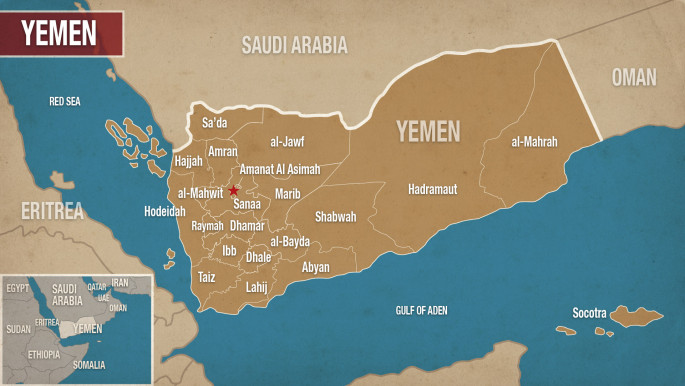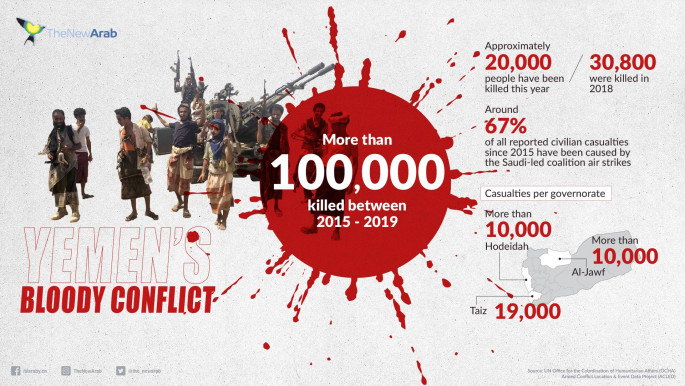Yemen's Houthis drop 'tax' threat that jeopardised aid
United Nations leaders and aid groups held crunch talks in Brussels on Thursday to consider scaling back or suspending the delivery of vital supplies to millions of people at risk of starvation.
Humanitarian agencies have complained of a deteriorating situation in the Houthi-controlled north, with aid workers facing arrest and intimidation, as well as obstruction and bureaucracy that hampered their work.
In a letter seen by AFP and confirmed by the Houthis, the head of their aid body SCMCHA wrote to the UN's undersecretary general for humanitarian affairs Mark Lowcock informing him of a decision to "suspend the 2% and not apply it for this year 2020".
Abdul Mohsen al-Tawoos said the levy "was only to cover basic expenses so we can deliver all the assistance to our humanitarian partners" and that they hoped to find "alternative solutions that will enable everyone to fulfil their obligations".
A UN official in Sanaa confirmed the rebels had backed away from the levy.
"The cancellation of the tax is a positive development for sure," he told AFP, noting however that other issues that still need to be dealt with relate to "access and bureaucratic impediments".
Yemen has been driven to the brink of famine during five years of fighting between the Houthis and the internationally recognised government which is backed by a Saudi-led military coalition.
 |
We cannot pay donated aid money to one of the parties to the conflict |  |
The Brussels meeting heard that, while both sides have made trouble for humanitarian and UN agencies, the Houthi attempts to tax shipments triggered the latest crisis.
"It cannot continue, the biggest lifeline on earth is at stake. There are 20 million people in need in Yemen," Jan Egeland, head of the Norwegian Refugee Council, told AFP on Thursday.
"We cannot pay donated aid money to one of the parties to the conflict. So that is one of the many red lines that we are fearful of having to cross. We cannot do it," he said.
'Deeply alarmed'
The European Commission and the government of Sweden who called the Brussels meeting said Friday that the dire situation may still require aid to be scaled back.
"We are deeply alarmed at the rapidly deteriorating humanitarian space all over the country. It has reached a breaking point where delivery of life-saving assistance is at risk," they said in a statement.
The humanitarian groups' talks produced an agreement that if it became impossible to deliver aid without breaking their principles, responses could include "recalibrating humanitarian assistance, including a downscaling, or even interruption, of certain operations".
Yemen in Focus: UAE, Sudan announce withdrawal of troops as coalition 'reconsiders' brutal war
In an apparent reference to the dropping of the tax, they said that "the recent indication of willingness to remove constraints for aid delivery on the ground needs to be followed up".
The Yemen government has also sounded the alarm at reports the United States was considering suspending much of its humanitarian assistance in response to the pressures including the rebel tax.
 |
"Scaling back on aid in governorates under Houthi control will affect citizens, not the armed Houthi militias," Abdul Raqib Fateh, a minister and the head of Yemen's relief committee, told AFP last week.
Allegations of aid being diverted and obstructed are not new in Yemen, where 80 percent of the population needs some form of assistance.
One battleground has been expired food, with the Houthis accusing the UN of distributing maggot-ridden rice and flour, and aid workers saying that supplies had been needlessly held for months until they spoiled.
The UN World Food Programme, which feeds 12 million Yemenis a month, halted deliveries in Houthi-controlled areas for two months last year as it pushed for a biometric registration scheme to avoid the diversion of supplies meant for civilians.
Another SCMCHA official Mane al-Assal on Friday hit out at the latest warnings as "inhumane and immoral" and accused aid agencies of "looking for empty excuses to suspend aid".
Yemen's internationally-recognised government has been fighting Iran-backed Houthi rebels since they seized control of the capital in 2014.
A Saudi-led coalition intervened in 2015, fighting in support of the beleaguered Yemeni government.
Follow us on Twitter and Instagram to stay connected





 Follow the Middle East's top stories in English at The New Arab on Google News
Follow the Middle East's top stories in English at The New Arab on Google News


